THE IMAGINARIUM
‘This is an uncharted epoch, but creativity will endure,’ says multidisciplinary artist David Brits
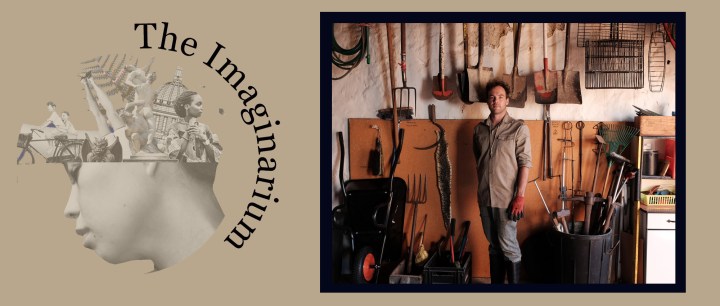
The Coronavirus lockdown has affected all aspects of life and the world of design, art and culture is no exception. In this series, we talk to artists, creatives, designers and musicians about their work and what inspires them during these surreal times.
Born in Cape Town in 1987, David Brits graduated from the Michaelis School of Fine Art, with a focus on painting, in 2010. His practice, which spans printmaking, drawing and video, has recently progressed into “public-scale sculpture”. Brits has created sculptural pieces for the Desmond Tutu HIV Foundation, the Spier Arts Trust and the Iziko South African National Gallery.

Sinusoidal Nebulous III. 2020. Carbon fibre, resin, aluminium. 65 (H) x 56 (D) x 55 (W) cm. Edition- Unique
Just before the start of lockdown, he was announced, along with his collaborator, Raiven Hansmann, as one of the winners of the inaugural Social Impact Arts Prize, a “South African art prize with a focus on social impact that has a direct, measurable effect on individuals and communities”, launched by the Rupert Art Foundation and the Rupert Museum.
For the Imaginarium series, the young artist selected observational pen sketches drawn during his first sailing trip across the Atlantic Ocean.
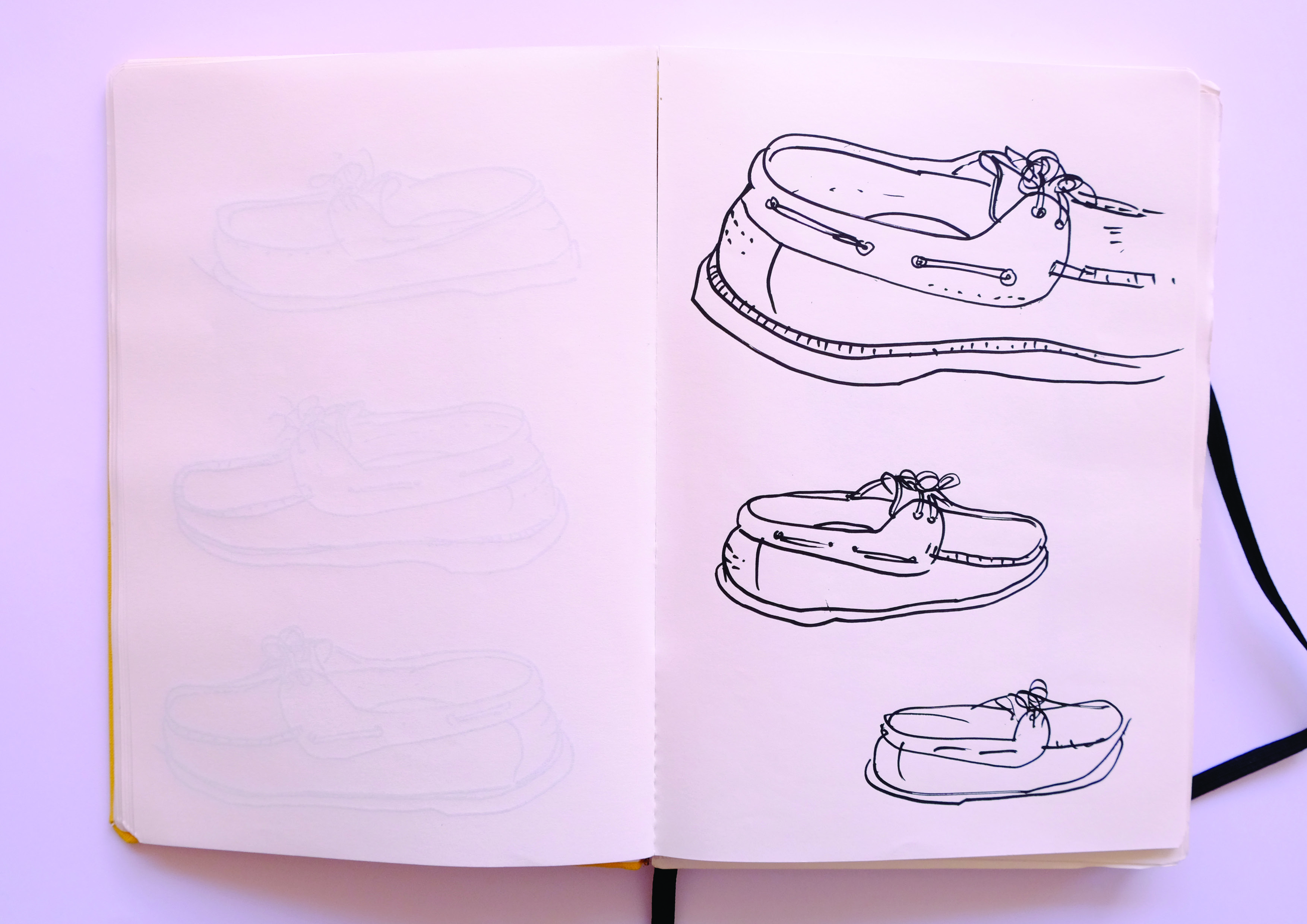
David Brits. Excerpt from Atlantic Sketchbook. 2013. Indian ink on Munken Pure.148 x 210 mm
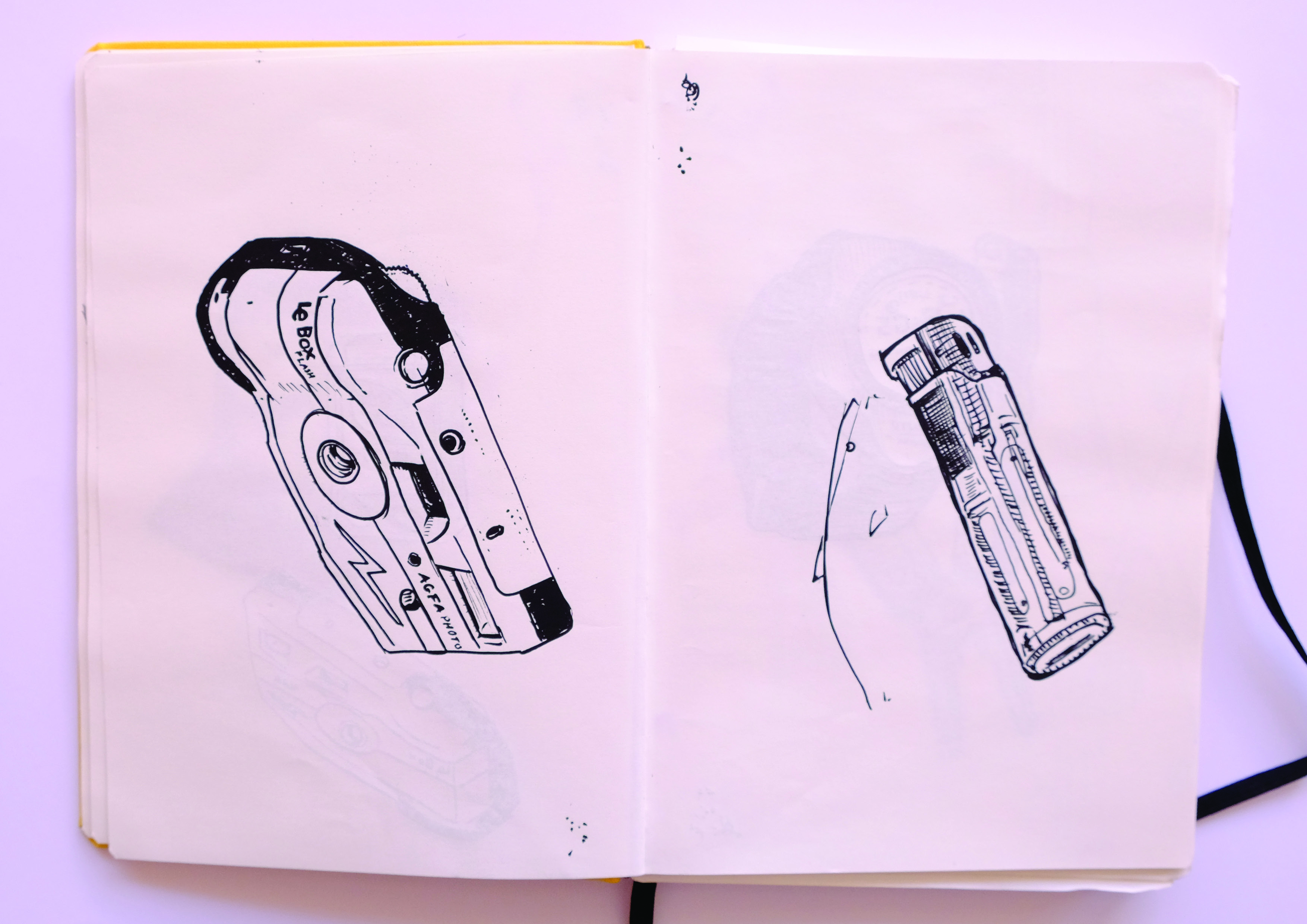
David Brits. Excerpt from Atlantic Sketchbook. 2013. Indian ink on Munken Pure.148 x 210 mm
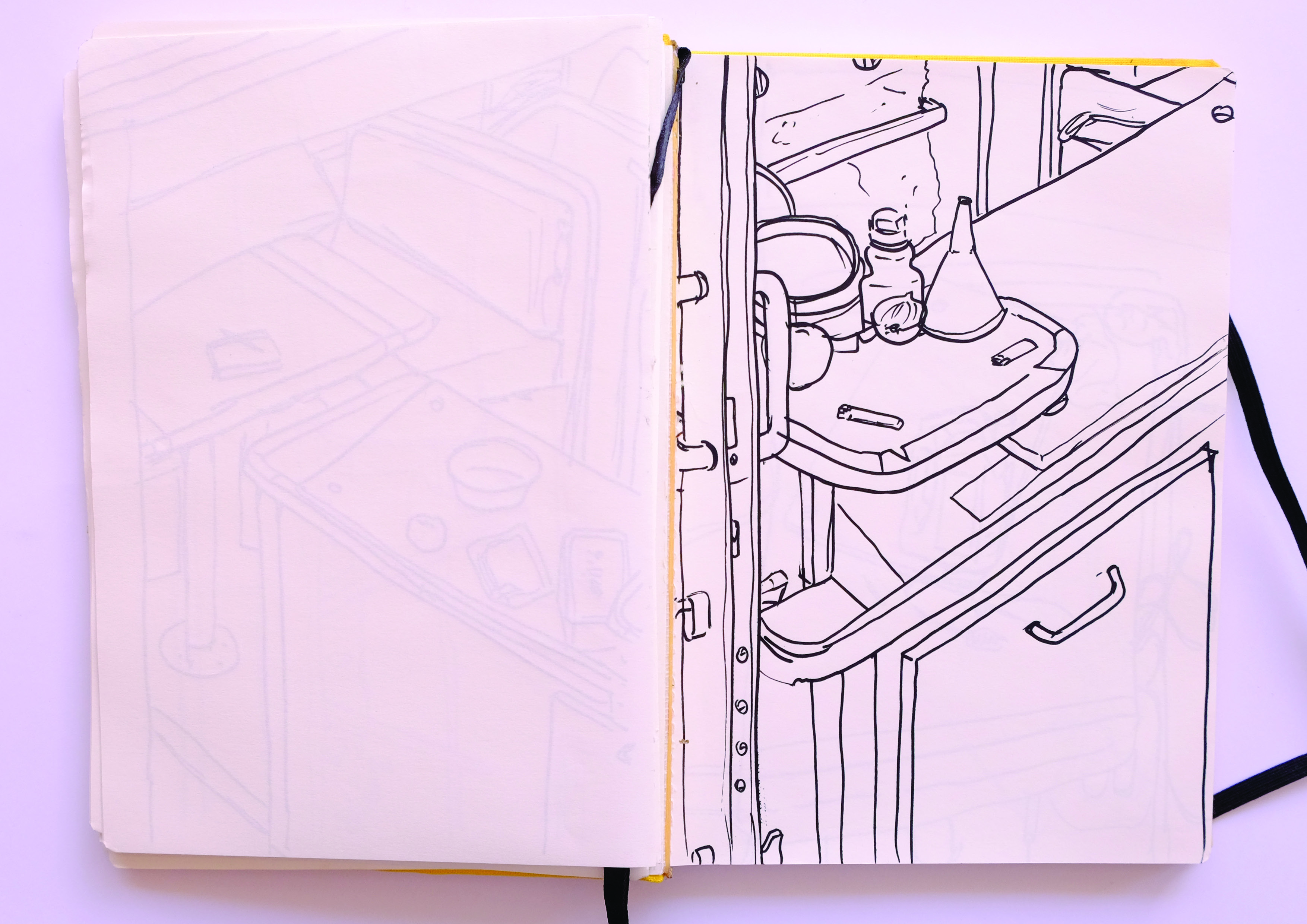
David Brits. Excerpt from Atlantic Sketchbook. 2013. Indian ink on Munken Pure.148 x 210 mm
He explains, “I made the 11,000km journey transporting a catamaran from Cape Town to The Dutch Antilles in the Caribbean in 2013. It took 43 days. By the time we made landfall on the island of St Martin, I had drawn almost every object on the boat. These sketches, along with several journals that I filled, bear strange testament to my first taste of extreme social isolation. Spending 43 days bobbing on the ocean with two strangers on a small yacht is no joke.
“I got the idea to sail across the Atlantic shortly after breaking up with my art school sweetheart. We had been dating for five years. A few weeks after the break-up, I was in a yoga class when something very peculiar happened. I can’t really explain it another way: while I was lying in savasana feeling terribly heartbroken, all of a sudden I hear this voice in my chest. It said, commandingly: ‘Dave, you have to go to South America and you have to sail there!’ Huh?!”
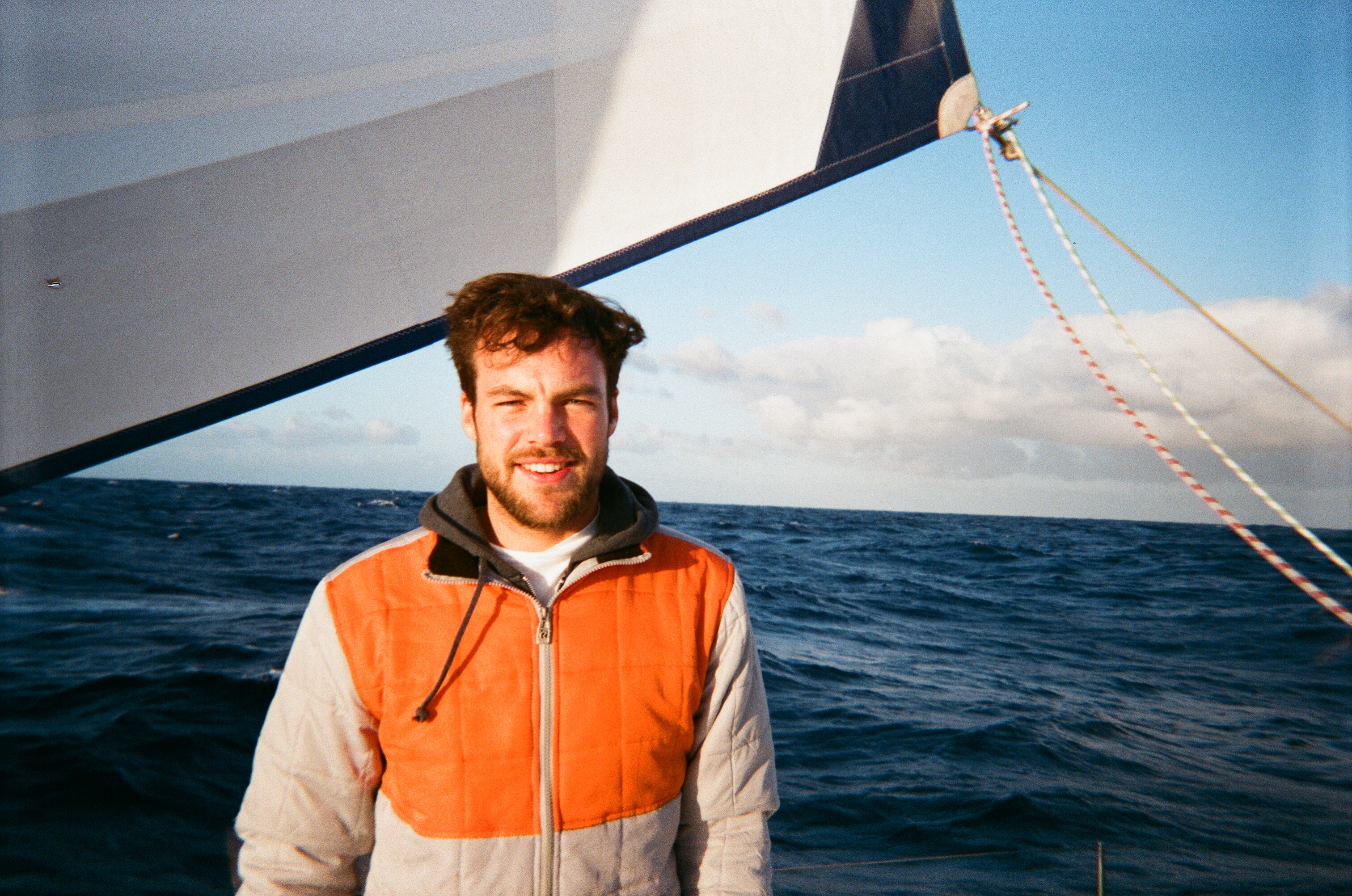
David Brits, crossing the Atlantic in 2013
Three weeks later, Brits found himself in what he called a seedy bar at the Cape Town Harbour, trying to persuade a sea captain that he was a capable sailor.
“I lied hard. I’d never really sailed before. But my fibs did the trick. With a shake of the hand the skipper agreed to let me join his crew of three. I had become his newly minted ‘deckhand’. I quickly made preparations to leave. That week I sold my car, packed up my apartment, art studio and notebook business. On a blustery South-East day, we set sail. I was nervous, cold and very seasick, all the while proud to be partaking in an old familial seafaring custom — almost all the men in my family have at one time or other sailed across the Atlantic Ocean”.
And for a few years now, he has been drawing relentlessly in notebooks, illustrating everything his eyes capture, translating life around him into sketches.
“I always keep a drawing book which I add to with religious zeal. Up until now, these folios have been private – a way for me to come to grips with a perennially difficult task: how to accurately portray the world with pen and paper.”
At times imperfect, or incomplete, the drawings are but a tiny glimpse of the world as if it had been broken into a thousand objects. It seems, and not surprisingly, considering Brits’ professional experience as an archivist, that his work is as much about trying to make sense of life and his story/history, as it is about constructing a visual archive of it. And also, marking it for posterity.
Over the past nine years, he has run a signwriting and mural company called Cape Town Signwriting that creates “large murals and hand-painted signs that can be seen in restaurants, hotels, bars, butcheries and breweries across the city”.
Today, he says that his business has been put “on hold”, forcing him to move back in with his parents.
“It has been a sobering exercise indeed.
“In the first weeks of lockdown – and for only the second time in my life – I experienced a great deal of anxiety and depression. I found myself overwhelmed by apocalyptic visions: medieval demons with glowing eyes devouring the heads of people in long breadlines. I felt hopeless and realised why they call it a depression. It’s not just a term in economics — it’s the governing emotion that pulls everybody and everything down.”
Brits adds that “Apart from sketching a copy of Francesco Goyas’ etching Great Deeds! With Dead Bodies! from his Disasters of War Series (1812-14), I’ve done none of the linocuts, carbon-fibre sculptures or drawings I grandly envisioned myself creating when I packed my car and locked my studio almost a month ago.”
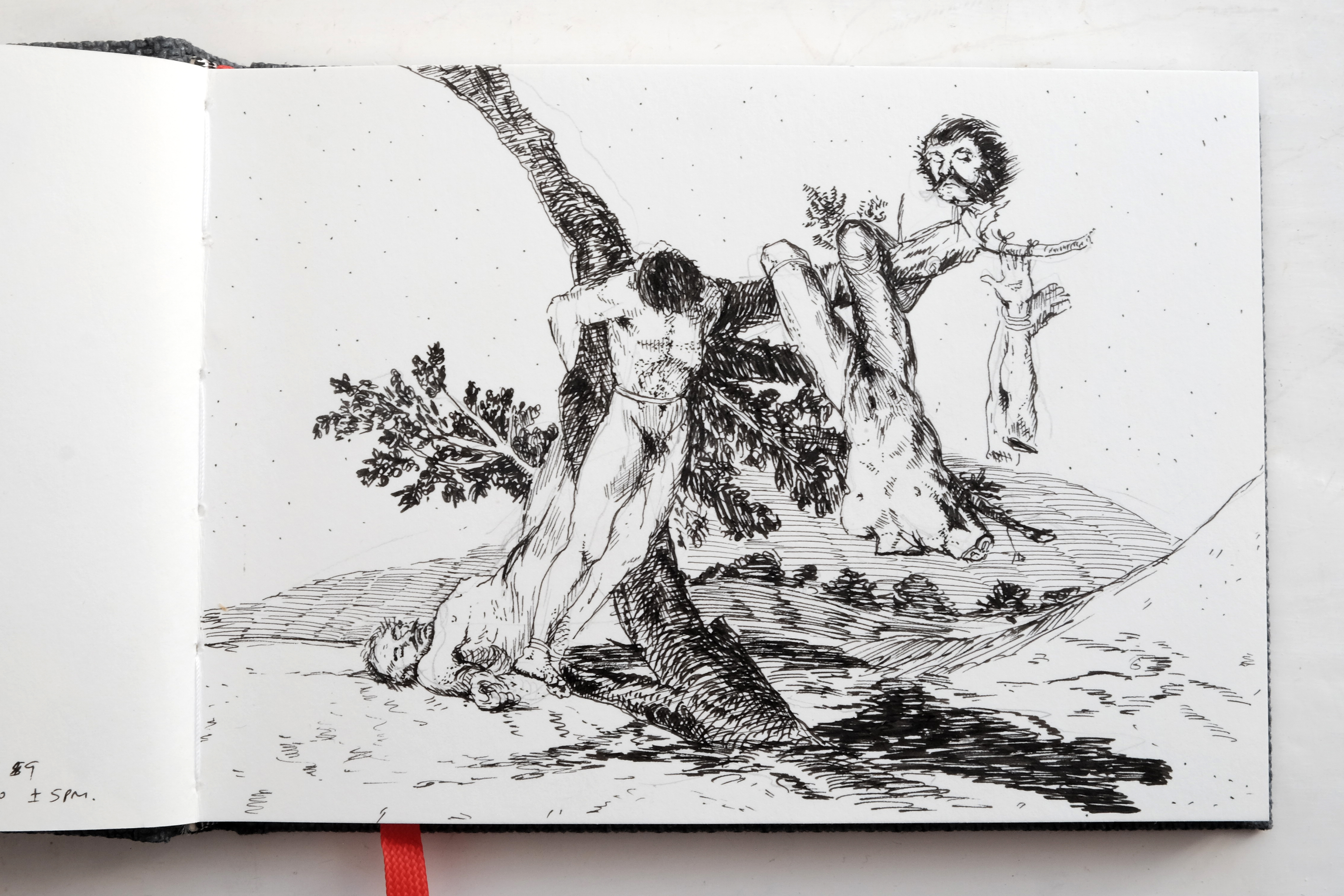
David Brits (2020) After Goya’s Great Deeds! With Corpses! Pen on Hahnemuhle. 145x105mm
The reason: his art equipment is still in boxes. This sentiment has been echoed by many artists who, under lockdown, are prevented from accessing their studio, tools and equipment.
“I’ve not made art, I have lugged stones instead. Each day for the last three weeks I have been working on a series of dry-pack stone earthworks in the firebreak at the back of my mother’s house. The oldest houses in the area were built with stone quarried from the mountainside, and the hillside is strewn with the detritus of this bygone industry. This leftover cut rock has become the raw material for a series of tracks, retaining walls and stone circles that I have begun to construct.
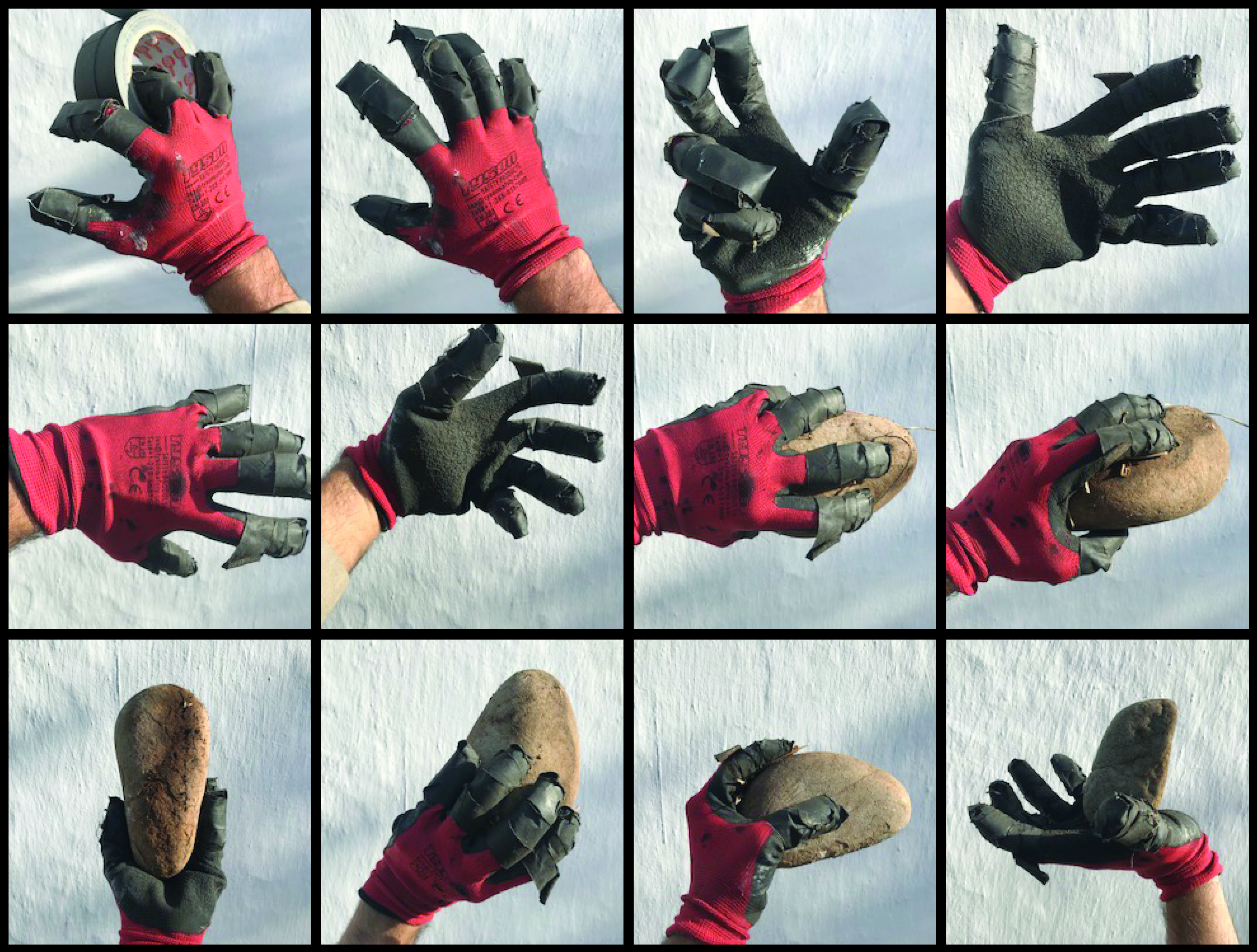
David Brits. Modified working glove with river pebble
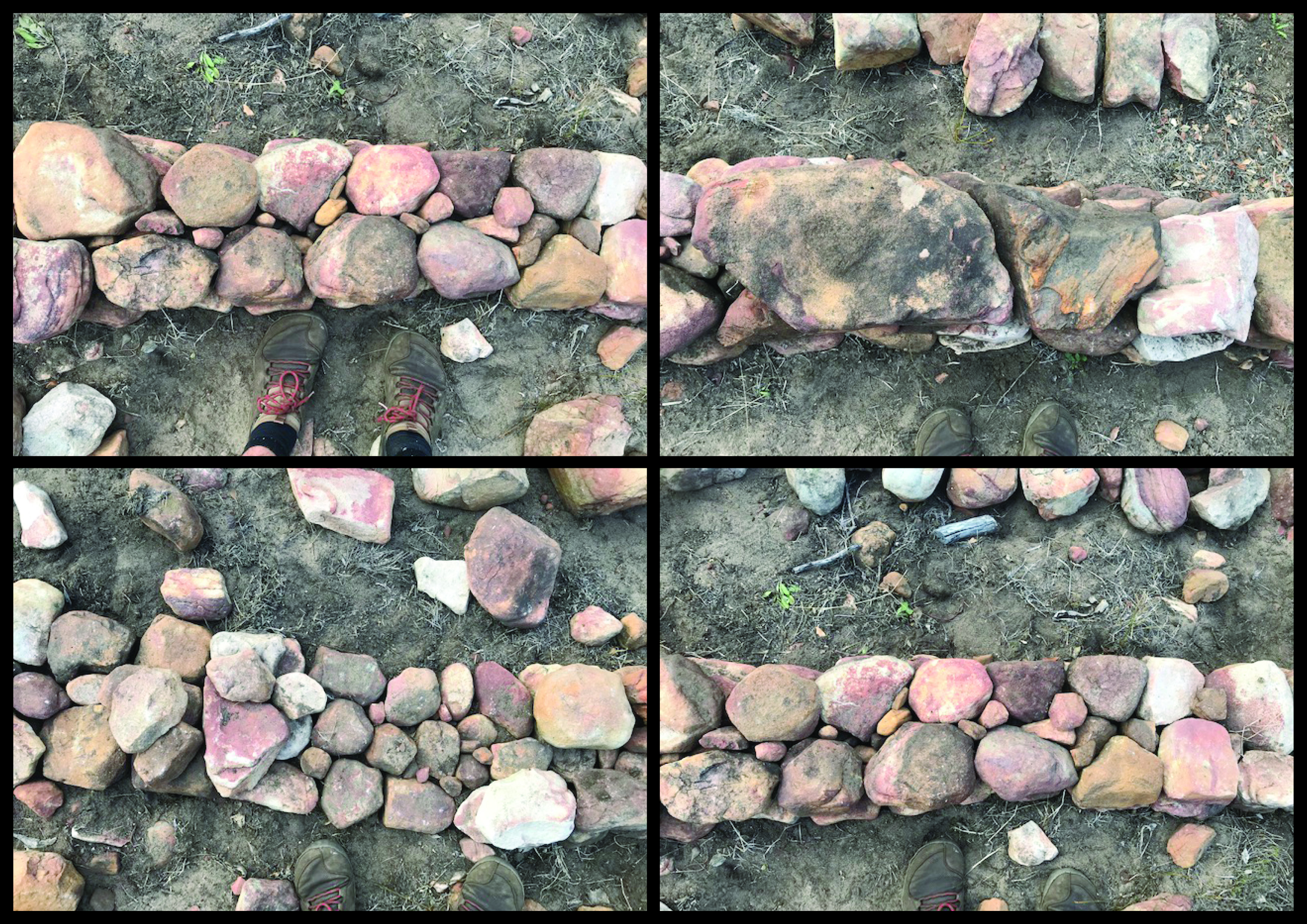
Rock Wall Frame (Image by David Brits)
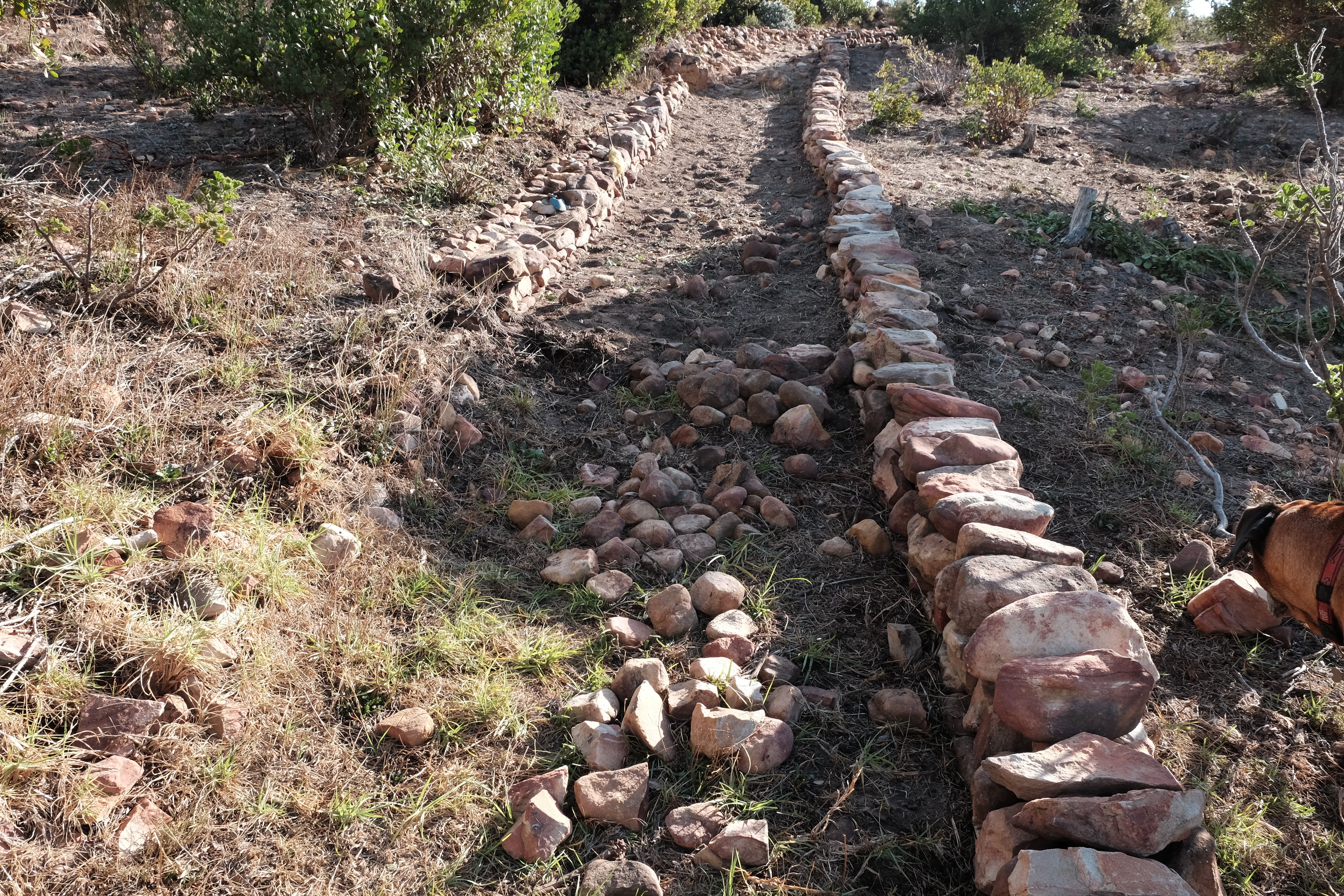
Construction of a dry-wall path using quarried rock (Image David Brits)
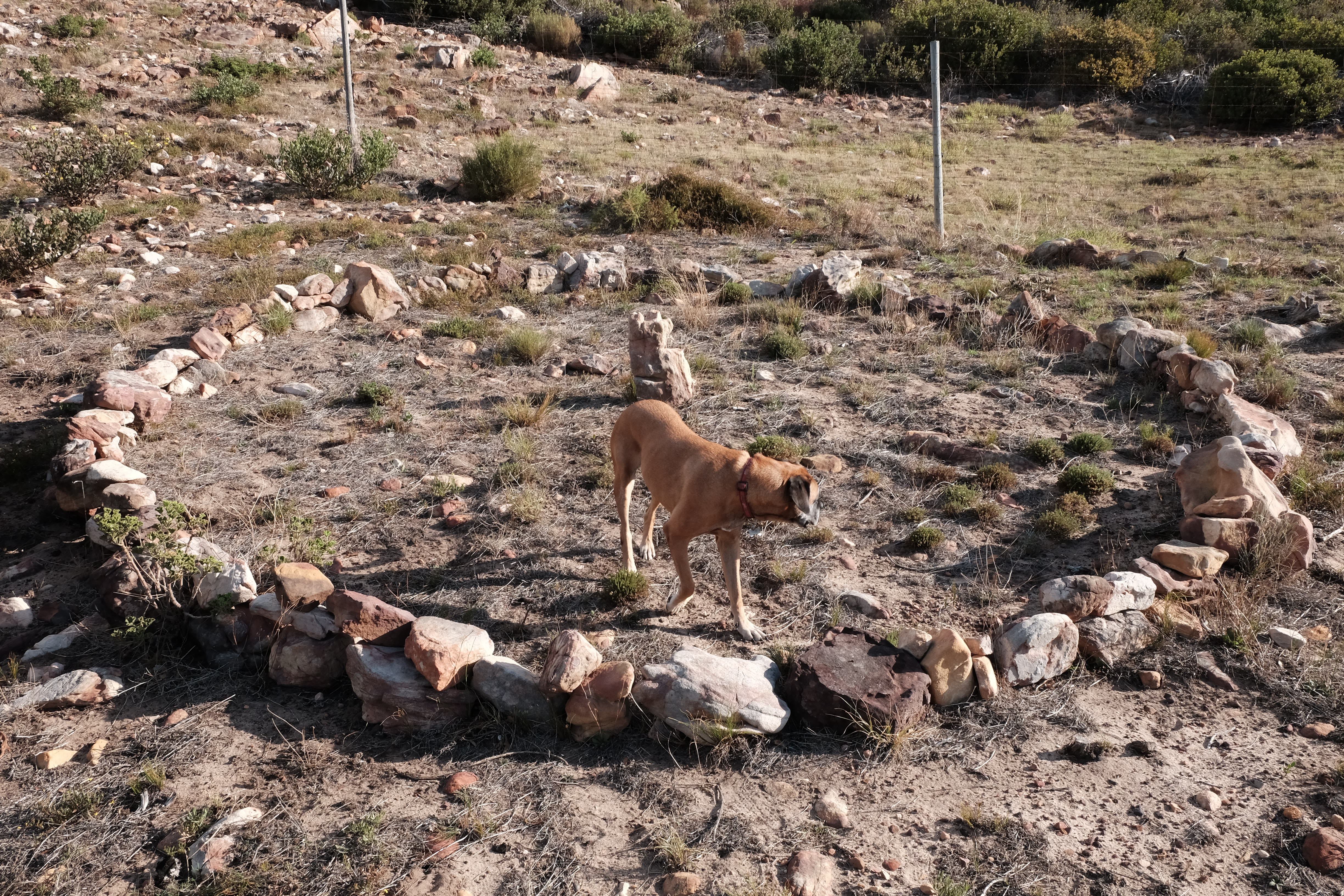
A large stone circle made by Brits in a firebreak (Image David Brits)
“Working unaided, my tools are few and simple: a pickaxe, gloves reinforced with duct tape, a spade, a plumbline, wheelbarrow and back brace (the larger stones weigh upwards of 40kg). The activity of building dry-pack stone rock walls is as old as architecture itself. Going is slow and tough, but there is something cathartic about inadvertently becoming a custodian of this ancient tradition. For me, this is a heavy brand of physically embodied emotional release. Lifting, rolling, placing, setting — these are the verbs that have become a counterweight to the maddened thoughts of despair and the tightening noose of anxiety.”
About the future, Brits is convinced that it won’t be easy; but that no matter what, art – and artists – needs to be protected.
“Both the world and the art world are in for a very hard time. We stare out into an abyss — a terra incognita for which there is no map, let alone a vaccine. Yet, in times of darkness, art cannot be done away with. As history and collective experience of the lockdown attests, art is essential to lift the eternally flailing human spirit. But art — particularly in South Africa — is going to have to get much closer to the ground. Using creativity as a modality of care; to educate children, to feed the hungry, to be of service, whatever service may look like on the other side of this. This is an uncharted epoch, but creativity will endure. Ars longa”.
And indeed, as the Greek physician Hippocrates once said: “Ars longa, vita brevis.” DM/ML
If you would like to share your ideas or suggestions with us, please leave a comment below or email us at [email protected] and [email protected].
Sign up for our newsletter to get the best of Maverick Life delivered to your inbox every Sunday morning.
















 Become an Insider
Become an Insider